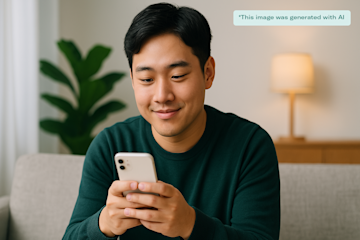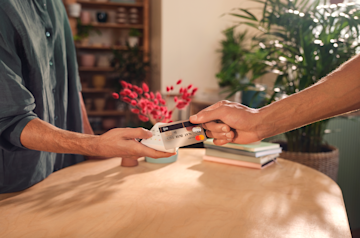
Starting from €0 in your 30s
It’s never too late to build toward a solid financial future. Here’s how one of our writers bounced back from hitting rock bottom in her early 30s.
6 min read
When I turned 30, my finances were a mess. I had next to nothing in my bank account, no financial security net, no pension to speak of, and mounting student debt. But, compared to many of my peers, my situation wasn’t unique. I spent my 20s living paycheck to paycheck and I didn’t understand how to manage or even think about my finances. My bank account was essentially a giant sieve that I poured money into each month, and I had no idea where my money went.Then the pandemic hit. With my already-dire financial situation plummeting to new levels of desperation, I was forced to make some changes. Three years later, I’m free of the crippling financial anxiety that defined my 20s. I can now check my balance (even multiple times a week!) without sparking an existential crisis and I’m finally in control of my finances. Here’s how I shifted my relationship to money and started building toward a solid financial future from €0 in my early 30s.I’m not one of those people who have a clear calling in life. While many of my friends spent their 20s steadily climbing up a predictable career ladder, I spent mine hopping from one entry-level job to another. As I enjoyed variety and wasn’t particularly money-motivated, in many ways this lifestyle suited me well. But, as my peers started reaching traditional milestones, like getting on the property ladder while I spent another month living off of frozen chips, I couldn’t help but wonder whether I was doing something “wrong.”In reality, there was nothing wrong with my lifestyle, but the way I was managing my money was far from ideal. Looking back, the biggest difficulty I faced was that I lacked any sense of my future self. I lived in a perpetual state of “now,” which, while sounding like a mindfulness dream, was a financial nightmare. When payday rolled around, over half my money would immediately evaporate on living expenses, and the rest I spent on whatever I was doing at that moment. I had no idea where my money went. Rather than controlling my finances, my finances were controlling me, which made checking my balance a deeply anxiety-inducing experience.Without fail, by the end of the month, my balance would be hovering around €0, and an increasing feeling of dread would begin to consume me. The only thing that could temporarily soothe it was the arrival of my next payslip. I realize now that this sense of dread was probably a cry for help from my future self. As it stood, Future Me was woefully financially underprepared for an emergency, unable to get herself out of debt, not working towards any financially fulfilling goals, and would most likely be left fending for herself in old age. In all honesty, Future Me was in pretty bad shape. Shortly after turning 30, COVID-19 arrived. Like millions of others, I found myself living in lockdown. At the time, I was working as a freelancer, riding the roller coaster ups and downs of an unpredictable income and continuing to avoid my bank balance, ironically, like the plague. Within a month, I had lost all my clients and with it, all of my income. For someone with only €20 in the bank to weather them through the storm, this was a certifiable financial disaster. Over the next six months, I lived off government aid, loans from a few supportive friends, and a ceaseless wave of adrenaline that helped me frantically apply for any job I could find. Luckily, I managed to land a fully remote position at a startup and with it, a fixed, stable income. When my first paycheck hit my account, the relief I felt affected me so profoundly that I realized I could no longer:Having just barely made it through a personal financial crisis, my first priority was to pay back the friends that had so generously lent me money during those difficult months. When my first payslip arrived, I roughly calculated how much I needed to cover all my essentials (i.e. rent, bills, food), and worked out how much I could comfortably set aside each month. I didn’t know it then, but this was me creating my first budget. It seems like such a simple thing, but getting a rough idea of my monthly outgoings was a complete revelation. For the first time, I was able to peek behind the curtain and start understanding my finances. From here, I began questioning some of my more unpredictable spending habits and started making some changes that allowed me to save more each month. This was a game changer because, even though I owed my friends a lot of money, I began to feel like I was in control of my money, not the other way around.Once I started to feel more in control of my finances, it became much easier to experience my money as a useful tool rather than as a toxic, unreliable friend. Having cultivated a regular saving habit by slowly paying my friends back, I began to think more seriously about the financial needs of my future self. Unsurprisingly, the first goal on my list was to create an emergency fund. Month by month I started putting some money into an emergency fund until I reached my goal and with it, the discovery that I could breathe easier knowing I was better prepared for the future. It wasn’t until I’d created a savings buffer that I began to understand the feeling of security that setting money aside can create.From this point, taking on bigger financial goals such as tackling my student debt and saving for retirement, which had previously seemed unsurmountable, now seemed possible. For me, the key to going from €0 to a feeling of financial security was three-fold:
N26 offers a simplified and stress-free way of managing your money. With Spaces, you can create multiple savings sub-accounts, each tied to one of your savings goals, making it easier to reach your financial targets. Plus, thanks to instant push notifications each time money enters or leaves your account, staying up-to-date with your finances has never been simpler. You’ll also gain a deep understanding of your spending habits with Insights and get a monthly snapshot of your financial health with your Monthly Wrap-Up. Find the right account for you.
My 20s were fun – but a financial disaster
Living in a perpetual now
Hitting financial rock bottom
- Live in fear of my finances
- Ignore the needs and goals of my future self
- Deny that I’d spent the past decade living in a perpetual state of financial anxiety
Starting from zero
The snowball effect
- By arming myself with knowledge, I was able to switch the narrative from “I’m at the mercy of my bank account” to “I’m in control of my finances.”
- I was able to use my newly discovered feeling of empowerment to create some new financial habits.
- I discovered I could use these habits to create a sense of financial security – something I’d been lacking up until that point.
Your money at N26
Find similar stories
BY ELLEN BOWDENN26 Contributing Writer
Related Post
These might also interest youLIFESTYLECould AI help you manage your money?86% of people are open to using AI for financial planning, but is it safe? Learn how AI is already transforming money management, and discover the pros and cons.
4 min read
LIFESTYLEUnderstanding tariffsFrom higher grocery bills, pricier electronics, and stock market swings, tariffs can impact your wallet and your investments.
5 min read
LIFESTYLEDe-hyping the no-spend challengeThis extreme challenge promises to transform your finances, but is it really the game-changer it claims to be?
4 min read


